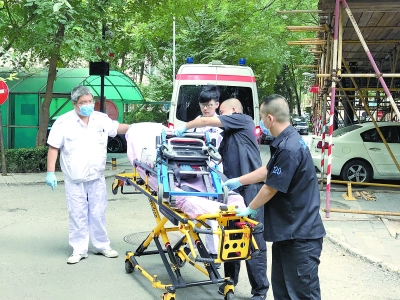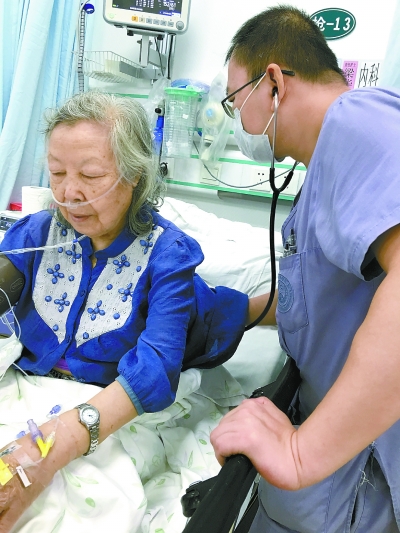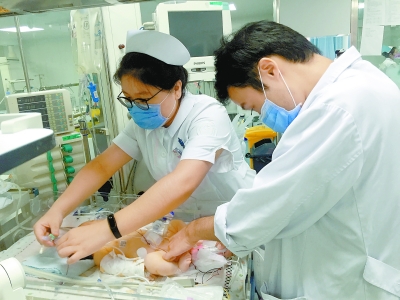The first Physician’s Day witnessed a special and ordinary day for doctors.



August 19th is the first "China Physician’s Day", and 3.39 million medical practitioners in China have their own festivals. On this day, how did the majority of doctors live? Yesterday, the reporter visited some hospitals in this city and witnessed a special and ordinary day for doctors.
Location: Beijing Emergency Center Person: Wei Jian, 120 doctor on board.
It is an iron law to leave within two minutes.
Our reporter Wang Tianqi
In the morning, before 7: 30, Wei Jian, an emergency doctor, has been busy in the emergency equipment supply room of Beijing Emergency Center, checking whether the conventional first-aid items such as medicines, syringes and bandages in the first-aid kit are complete, whether the oxygen in the oxygen cylinder is sufficient, and whether the ventilator can be used normally … … "Stand by at any time, leave the car in two minutes, and all the preparations have to be done in advance." Wei Jian kept his hands and said without looking up.
Soon, the first departure instruction came: a lady near Beijing South Railway Station was unwell and had low blood pressure.
"Gao, we have everything. Let’s go!" Wei Jian picked up the first-aid kit and greeted Gao Shuo, the nurse accompanying the train crew. It took less than a minute from receiving the instruction to the ambulance opening the discharge door.
As soon as the ambulance drove to Qianmen West Street, it encountered a red light. Wei Jian was worried about the patient and wanted to make a phone call to ask about the situation. The instructions from the 120 receiving center came from the hand desk: "Just now, the patient at South Station called to return the car, saying that his blood pressure was not accurate before, but now it is much better. You should take a taxi to a nearby hospital yourself, so go back … …”
Wei Jian didn’t feel any displeasure after a trip in vain. "This kind of situation is very common. No matter whether the patient’s condition described by the train crew is critical or not when receiving the instruction, we must ensure that the train starts within two minutes. This is our ‘ Iron law ’ 。”
At 11 o’clock, in the canteen, Wei Jiangang put a spoonful of soup into the bowl. When the instruction came, he immediately put down the bowl and set off again.
The patient is an old man with headache, dizziness and high blood pressure, and he can’t get up. After getting on the ambulance, Wei Jianli dialed the phone number of the patient’s family from the newspaper receiving center. "Hello, we are 120 first aid, and we have already set off. Don’t worry, tell me about the patient’s condition first, whether there is a basic medical history, and whether you feel uncomfortable in the past few days?"
"The old man is very dizzy now, especially uncomfortable … … I fell yesterday and got two stitches … … There’s nothing wrong with it. I’m usually in good health … … Come on! " There was an anxious voice from the patient’s family on the phone. Wei Jian calmed his family members’ emotions, while continuing to ask about the specific situation of the elderly, and at the same time guiding his family members to keep the elderly lying flat and ventilated indoors.
Ten minutes later, the ambulance stopped under the residential building. Wei Jian jumped out of the ambulance, picked up the first-aid kit and rushed into the elevator, followed by the first-aid assistant pushing the hospital bed.
The old man was lying in bed, his head wrapped in gauze. Wei Jian leaned forward and whispered in the old man’s ear, "Can you hear me? Raise your left hand. " Seeing that the old man answered his words and made an accurate action, Wei Jian’s frowning brows relaxed a little, and hurriedly called the nurse to take the old man’s blood pressure. "The old man is conscious, so don’t be afraid." Wei Jian told the patient’s family that he had carefully inquired about the head injury. The family said that the old man fell down the day before because of dizziness and had a needle in his head. "That is still to get a CT from the hospital. Delayed cerebral hemorrhage may occur after head injury in the elderly."
After some examination, blood pressure and electrocardiogram were normal. Wei Jian found a stretcher and carried the old man to the hospital bed with his colleagues and family members. Before going downstairs, Wei Jian also carefully told the family members of the elderly, "Take cash and medical insurance cards and bring a plastic bag for fear that the elderly will feel dizzy and want to vomit."
I ran upstairs and downstairs twice, and Wei Jian, who was slightly fat, gasped. "In fact, this is already very good. I can still take an elevator. When I meet an old community, there is no elevator. There are many cases where patients are carried down on the sixth and seventh floors!"
When he arrived in xuanwu hospital, Wei Jian instructed his family members to register the old man, arranged the hospital bed, and handed over the old man’s condition to the resident one by one, so that Wei Jian’s first aid mission was completely completed.
By the time he got back to the emergency center, it was close to 12: 30, and the food prepared by his colleagues was already cold. Wei Jian wolfed it down and "solved the battle" in five minutes.
"Emergency doctors eat fast, because maybe the next second’s dispatch order will come again, just make up a bite at the place where the needle is inserted." WeiJian hey hey smile, round face, eyes bent into a crack. "When Dr. Wei came to the center, he was a thin guy, which was all stress obesity." Colleagues teased Wei Jian, who scratched his head. "I can’t help it. I work at night and my diet is irregular. I’m not fat."
Venue: Beijing Friendship Hospital Person: Li Zhenhua, an emergency doctor.
It is meaningful to spend the holidays in the emergency department.
Our reporter Ren Shan
"32 beds need to be observed after the rescue, and 2 beds and 3 beds need further treatment to see if they are transferred to cardiology." At 8 o’clock in the morning, the emergency room of Beijing Friendship Hospital was quiet for a while, and the night shift doctor quietly handed over the shift to Dr. Li Zhenhua.
Li Zhenhua is on the day shift, from 8 am to 8 pm. The first thing after taking over is to inspect the critically ill patients in the intensive care room.
"Are you still uncomfortable today? Did you sleep comfortably last night? " Bed 3 in the emergency room is an old lady who is over 80 years old. Due to atrial fibrillation (persistent arrhythmia), she suffered from bradycardia due to taking drugs for a long time. She suddenly lost her breath at home last Friday morning. After being rescued, her vital signs were stable, but her heart rate was still high and low.
Seeing the doctor coming, the old man’s daughter immediately leaned over.
"The old man’s heart rate is still slow. I suggest to transfer to CCU (Cardiac Intensive Care Unit). You didn’t seem willing before. What do you think now? " The family was still hesitating, and the old man in the hospital bed took Li Zhenhua’s hand. "Doctor, I listen to you."
After communicating with his family, Li Zhenhua hurried back to the nurses’ station to communicate the old man’s transfer to CCU. At this time, there was a sudden groan in the intensive care room, and Li Zhenhua ran to bed 32.
The old lady in bed 32 was curled up on the bed with intravenous drip. The old man was sent to the rescue two days before acute cerebral hemorrhage. Although he is out of danger and in stable condition, he is still very painful occasionally. "We want to transfer to a hospital near our home, and we don’t want to always run back and forth like this." Looking at the family members in the hospital bed, the family members made demands. "The condition is stable and can be transferred to hospital for treatment." Li Zhenhua said after the inspection.
I was still explaining here when suddenly a cry for help came: "Doctor, doctor, come and see my mother!" " An old lady was pushed into the emergency room.
"What disease?" "Acute cerebrovascular disease." "Is your mind still clear?" "Very clear." After a brief communication with the nurse, Li Zhenhua comforted his family. "Don’t worry, the neurologist will arrive soon, and arrange the hospital bed first." At this time, another doctor brought good news to Li Zhenhua. "The transfer of patients in bed 3 to CCU has been arranged."
Every day in the emergency room, like the morning of this battle, alternately staged sadness and joy.
After a round of rounds, 18 internal medicine patients spent nearly two hours in Li Zhenhua, and they also dealt with two sudden illnesses without drinking a mouthful of water. Li Zhenhua, who has worked in emergency for 18 years, has become accustomed to this pace of work.
Speaking of Physician’s Day, Li Zhenhua is also very happy. "This is the recognition of our society. It is meaningful to be able to spend the holidays in the emergency department during our festivals. "
At 11 o’clock noon, the family members of patients in the intensive care unit began to visit. Li Zhenhua returned to the doctor’s workstation and began to sort out the patient’s test results. Next, he will work with other doctors to make a diagnosis and treatment plan for each patient.
Venue: Capital Institute of Pediatrics Character: Li Qi, a pediatrician
The recovery and discharge of children is the most wanted gift.
Our reporter Liu Huan.
Less than 8 o’clock, in the surgical ward on the sixth floor of the inpatient building of the Capital Institute of Pediatrics, Li Hao, deputy chief physician of general (newborn) surgery, changed his white coat and hurried into the ward.
A day’s work began with the children crying one after another.
See the patient, prescribe the doctor’s advice, do the treatment, and even go to surgery at any time because of the sudden illness of the child … … On the same day, Li Qi and two other doctors were responsible for guarding more than 90 children in the ward.
"Doctor, please take a look at it for me. The child’s defecation after operation is not very good … …” At the door of the ward, a parent with a child in her arms blocked Li Wei and asked anxiously. "The anastomosis of the child’s anus is open. It should be that the wound is swollen, which leads to the passage of excrement … …” As he spoke, Li Hao took a syringe and injected the child with a few milliliters of medicine to promote intestinal peristalsis. "Look again for half an hour."
During the rounds, Li Jie’s cell phone rang from time to time. He communicated with his colleagues about the operation arrangement for a while, and then remotely instructed other medical staff to deal with various unexpected minor situations of the children.
Li Qi, 37, has been working in the First Children’s Hospital for 11 years. His specialty is pediatric surgery for intestinal diseases. "In our department, the vast majority of children admitted are concentrated in four major diseases: anal atresia, Hirschsprung’s disease, biliary atresia and choledochal cyst." Li Wei told reporters that these diseases that sound dangerous and abnormal are very common in pediatric surgery.
In Li Hao’s department, "white plus black" is the normal state of work, and it takes 24 hours or even longer to be on duty. At the busiest time, there are more than 20 operations a day in the general department, and it is common for one person to have five operations a day.
At 9: 40, Li Hao was called away by a phone call. In the neonatal internal medicine ward, a two-day-old child needs consultation because of lung malformation. For a whole hour, Li Hao and doctors from ultrasound, radiology, chest and other departments discussed countermeasures for the next treatment of children.
When waiting for the elevator, Li Hao, who took off her mask, showed a trace of fatigue on her face. In fact, Li Jie, who is on duty on weekends, and his wife and daughter at home have long been used to it. Li Wei said that it is basically a "big shot" for the family itself, and all the prostitutes who go to kindergarten are taken care of by their wives. The daughter said, "Dad should leave more time for other sick children." In his mobile phone, there are many photos of smiling children after recovery. Li Wei said that he owed a lot to his daughter, but when other children recovered and were discharged from the hospital, it was his most fulfilling moment. These were the gifts he most wanted to harvest on Physician’s Day.
In the afternoon, when the reporter left, Li Hao was once again "blocked" by the parents of the patients. On this big duty, he has been staring at 8 pm on August 20; And the next day, he will go to the surgery clinic for one day … …